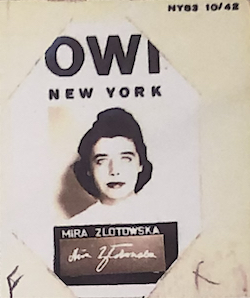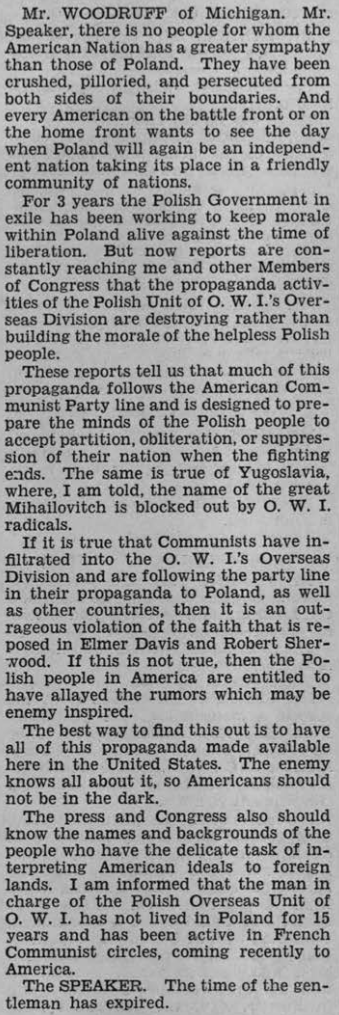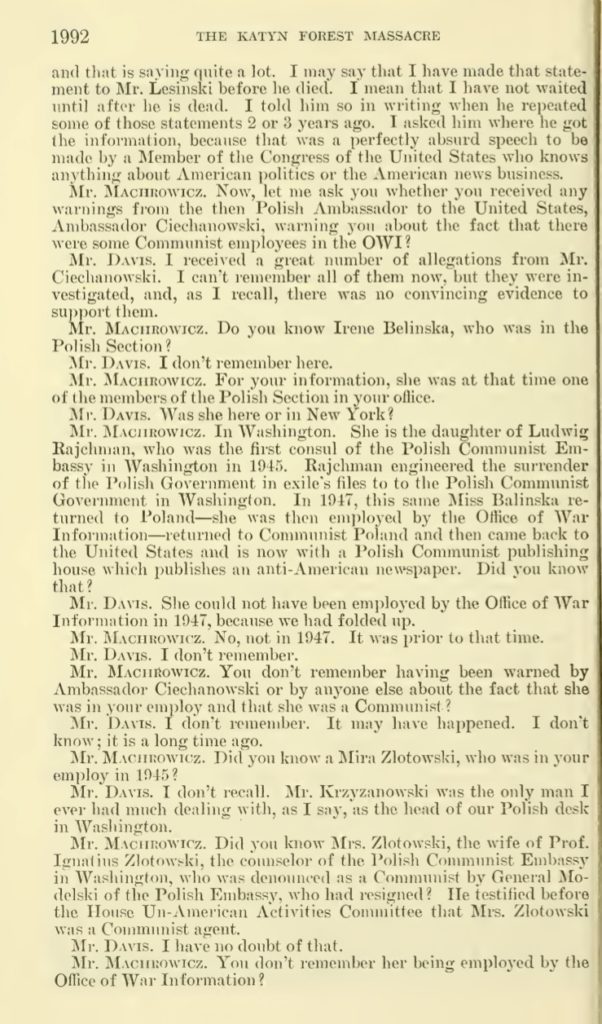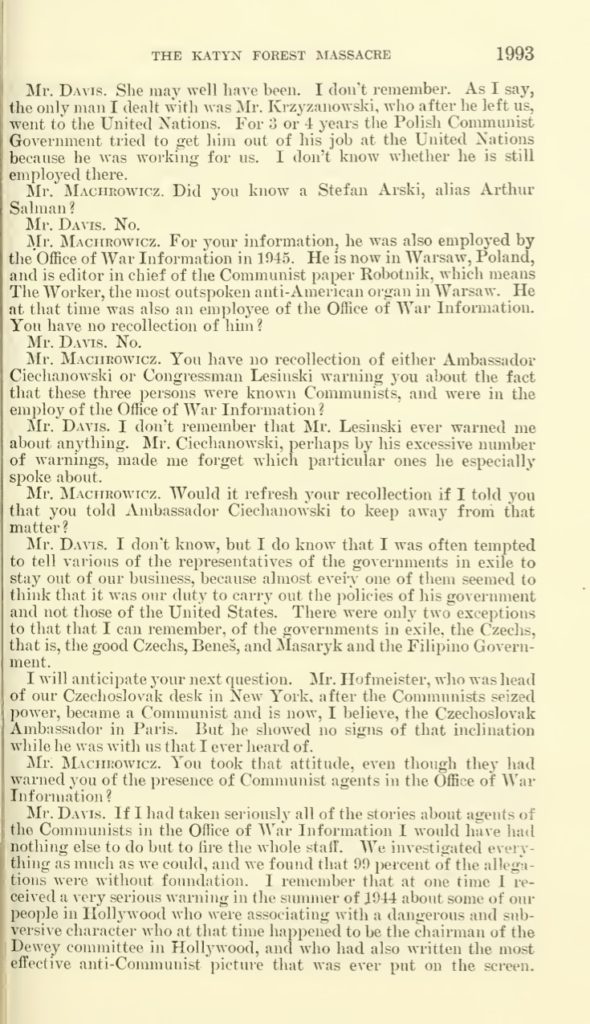Mira Złotowska – Michałowska — congressional warnings
By Ted Lipien for Cold War Radio Museum
Soviet influence at Voice of America during World War II — documents and analysis

Soviet influence at WWII Voice of America
From VOA to communist regime journalist
Choices of VOA’s pro-Soviet journalist
VOA journalist marries Communists
A pro-Soviet propagandist at OWI and VOA
VOA communist partner Stefan Arski
Pro-Soviet collaborators at OWI and VOA
A VOA friend of Stalin Peace Prize winner
Among Soviet sympathizers at VOA
Critics of her communist influence at VOA
Was she VOA’s communist ‘Mata Hari’?
Mira Złotowska, later known as Mira Michałowska who published books and articles in English as Mira Michal and used several other pen names, was one of many radically left-wing journalists who during World War II worked in New York on Voice of America (VOA) U.S. government anti-Nazi radio broadcasts but also helping to spread Soviet propaganda and censoring news about Stalin’s atrocities. While not the most important among pro-Soviet propagandists at the Voice of America during the war, Michałowska later went back to Poland, married a high-level communist diplomat and for many years supported the regime in Warsaw with soft propaganda in the West while also helping to expose Polish readers to American culture through her magazine articles and translations of American authors. One of the American writers she translated was her former VOA colleague and friend, the 1953 Stalin Peace Prize winner Howard Fast who in 1943 played an important role as VOA’s chief news writer. Despite today’s Russian attempts to undermine journalism with disinformation, the Voice of America has never officially acknowledged its mistakes in allowing pro-Soviet propagandists to take control of its programs for several years during World War II. Eventually, under pressure from congressional and other critics, the Voice of America was reformed in the early 1950s and made a contribution to the fall of communism in East-Central Europe.
Congressional warnings
One of the earliest warnings of Soviet subversion of U.S. government overseas radio broadcasts came in April 1943 from Republican U.S. Senator from Ohio, Robert A. Taft, the son of William Howard Taft, the 27th President of the United States. In a speech on the Senate floor on April 19, 1943, Senator Taft warned of “ugly rumors abroad” that much of American “short-wave broadcasting is futile and idiotic, and very inferior to that of other nations.” “It is said that some of it is communistic and some of it is fascistic, and that much of it tries to play European politics, about which we know nothing, instead of presenting the American point of view,” Senator Taft added. There was no evidence that any of VOA programming during the war was intentionally pro-Nazi—it was intended to be strongly anti-Nazi—although some of the simplistic anti-Nazi propaganda could have been seen as having an impact contrary to its intended aims.
There was, however, clear evidence of massive VOA propaganda in favor of the Soviet Union and Stalin’s plans to control Eastern Europe to the point of harming American interests and damaging America’s other allies and their democratic governments against whom some of the Soviet-inspired VOA propaganda was directed. When Senator Taft issued his warning, Mira Złotowska and Stefan Arski were working on OWI and VOA propaganda targeting Polish speakers.
At the time Złotowska, Arski and Adolf Hoffmeister were employed by the Office of War Information, Congressman Roy O. Woodruff (R-MA) delivered on April 20, 1943 on the floor of the House of Representatives another early warning of Soviet influence over America’s radio outreach abroad. In addition to VOA broadcasts to Poland, Congressmen Woodruff also focused on VOA broadcasts to Yugoslavia, charging that both might have fallen under communist influence.

…reports are constantly reaching me and other Members of Congress that the propaganda activities of the Polish Unit of O. W. I.’s Overseas Division are destroying rather than building the morale of the helpless Polish people.
These reports tell us that much of this propaganda follows the American Communist Party line and is designed to prepare the minds of the Polish people to accept partition, obliteration, or suppression of their nation when the fighting ends. The same is true of Yugoslavia, where, I am told, the name of the great Mihailovitch [Draža Mihailović, a Yugoslav Serb general during World War II executed by the Communists after the war] is blocked out by O. W. I. radicals.
If it is true that Communists have infiltrated into the O.W.I.’s Overseas Division and are following the party line in their propaganda to Poland, as well as other countries, then it is an outrageous violation of the faith that is reposed in Elmer Davis and Robert Sherwood. If this is not true, then the Polish people in America are entitled to have allayed the rumors which may be enemy inspired.[ref]89 Cong. Rec. (Bound) – Volume 89, Part 9 (January 6, 1943 to December 21, 1943), 3607.[/ref]
A little over a year later, a Democratic politician, Congressman John Lesinski Sr. (D-MI), told the House of Representatives in remarks inserted in the Congressional Record on June 23, 1944 about Soviet propaganda in VOA radio broadcasts to Yugoslavia. Members of Congress were also concerned about pro-communist VOA broadcasts in Greek, French and Italian, as well as some VOA broadcasts in English.
Under present war restrictions, news in regard to our allies—or, for that matter, any foreign country—is not printed unless it has the approval of the Office of War Information, of which Hon. Elmer Davis is Director.
I have followed with a great deal of interest the releases in regard to Yugoslavia, and I cannot understand why the Director of War Information is feeding Communist propaganda to the American people in regard to the conditions in Yugoslavia.[ref]90 Cong. Rec. (Bound) – Volume 90, Part 5 (June 13, 1944 to August 24, 1944), June 23, 1944, A3320-A3322.[/ref]
OWI director Elmer Davis told a bipartisan investigative committee of the U.S. House of Representatives in 1952 that Congressman Lesinski was lying. Lesinski was not lying, but by then he was no longer alive to respond to Davis.
I recall that he [Congressman John Lesinski Sr.] made a speech in the summer of 1943 which contained more lies than were ever comprised in any other speech made about the Office of War Information, and that is saying quite a lot. I may say that I have made that statement to Mr. Lesinski before he died. I mean that I have not waited until after he is dead. I told him so in writing when he repeated some of those statements 2 or 3 years ago. I asked him where he got the information, because that was a perfectly absurd speech to be made by a Member of the Congress of the United States who knows anything about American politics or the American news business.[ref]Testimony of Elmer Davis before the Select Committee on the Katyn Forest Massacre, November 11, 1952, 1991-1992. [/ref]
Congress bans domestic propaganda
What Congressman Lesinski had said about OWI in 1943 has been confirmed by multiple sources. The arrogance of Elmer Davis, a journalist and a high-ranking Roosevelt administration official who accepted at face value the greatest Soviet propaganda lie of World War II about thousands of Polish officers murdered by the Soviets in 1940 in Katyń and at other locations in the Soviet Union and repeated it to domestic and foreign audiences despite warnings and evidence of Soviet guilt, was not only boundless but also typical of the agency’s top brass of that period.
Thanks to several lawmakers from both parties, the U.S. Congress became quite early into the war aware of Voice of America communist propaganda in broadcasts to Yugoslavia, Poland and other countries in Europe and Asia. Bipartisan critics almost succeeded in defunding foreign broadcasts even while the war against Germany and Japan continued. After the war, the passage of the 1948 Smith-Mundt Act ensured strict security background checks for Voice of America broadcasters, by then already working within the State Department’s bureaucracy. The postwar legislation also prevented VOA from having its programs distributed domestically to propagandize to Americans, as OWI broadcasters had been allowed to do during the war.
Warnings and recommendations issued in 1951 by the bipartisan Madden Committee, named after its chairman Ray Madden (D-IN), resulted in eliminating some of the Voice of America censorship of news and information about Soviet human rights abuses and genocidal crimes, including the Katyn massacre. In his testimony before the bipartisan committee, former OWI director Elmer Davis told Congressman Thaddeus M. Machrowicz (D-MI), a Polish immigrant who as a young child came to the United States in 1902, that he did not recall knowing Stefan Arski. He also said that he had never known or heard of Mira Złotowska.
Former OWI director under fire


Mr. MACHROWICZ. Now, let me ask you whether you received any warnings from the then Polish Ambassador to the United States, Ambassador Ciechanowski, warning you about the fact that there were some Communist employees in the OWI?
Mr. DAVIS. I received a great number of allegations from Mr. Ciechanowski. I can’t remember all of them now, but they were investigated, and, as I recall, there was no convincing evidence to support them.
Mr. MACHROWICZ. Do you know Irene Belinska[sic.; she was Irena Maria Balińska], who was in the Polish Section?
Mr. DAVIS. I don’t remember here.
Mr. MACHROWICZ. For your information, she was at the time one of the members of the Polish Section in your office.
Mr. DAVIS. Was she here or in New York?
Mr. MACHROWICZ. In Washington. She is the daughter of Ludwig
Rajchman, who was the first consul of the Polish Communist Embassy in Washington in 1945. Rajchman engineered the surrender of the Polish Government in exile’s tiles to to the Polish Communist Government in Washington. In 147, this same Miss Balinska returned to Poland—she was then employed by the Office of War Information—returned to Communist Poland and then came back to the United States and is now with a Polish Communist publishing house, which publishes an anti-American newspaper. Did you know that?
Mr. DAVIS. She could not have been employed by the Office of War Information in 1947, because we had folded up.
Mr. MACHOWICZ. No, not in 1947. It was prior to that time.
Mr. DAVIS. I don’t remember.
Mr. MACHROWICZ. Yon don’t remember having been warned by
Ambassador Ciechanowski or by anyone else about the fact that she was in your employ and that she was a Communist?
Mr. DAVIS. I don’t remember. It may have happened. I don’t know; it is a long time ago.
Mr. MACHROWICZ. Did you know a Mira Zlotowski, who was in your employ in 1945?
Mr. DAVIS. I don’t recall. Mr. Krzyzanowski was the only man I ever had much dealing with, as I say, as the head of our Polish desk in Washington.
Mr. MACHROWICZ. Did you know Mrs. Zlotowski, the wife of Prof. Ignatius Zlotoweki, the counselor of the Polish Communist Embassy in Washington, who was denounced as a Communist by General Modelski of the Polish Embassy, who had resigned? He testified before the House Un-American Activities Committee that Mrs. Zlotowski was a Communist agent.
Mr. DAVIS. I have no doubt of that.
Mr. MACHROWICZ. You don’t remember her being employed by the Office of War Information?
Mr. DAVIS. She may well have been. I don’t remember. As I say, the only man I dealt with was Mr. Krzyzanowski, who after he left us went to the United Nations. For 3 or 4 years the Polish Communist Government tried to get him out of his job at the United Nations because he was working for us. I don’t know whether he is still employed there.
Mr. MACHROWICZ. Did you know a Stefan Arski, alias Arthur Salman?
Mr. DAVIS. No.
Mr. MACIIHOWICZ. For your information, he was also employed by the Office of War Information in 1945. He is now in Warsaw, Poland, and is editor in chief of the Communist paper Robotnik, which means The Worker, the most outspoken anti-American organ in Warsaw. He at that time was also an employee of the Office of War Information. You have no recollection of him?
Mr. DAVIS. No.
Mr. MACHROWICZ. You have no recollection of either Ambassador Ciechanowski or Congressman Lesinski warning you about the fact that these three persons were known Communists, and were in the employ of the Office of War Information ?
Mr. DAVIS. I don’t remember that Mr. Lesinski ever warned me about anything. Mr. Ciechanowski, perhaps by his excessive number of warnings, made me forget which particular ones he especially spoke about.
Mr. MACHROWICZ. Would it refresh your recollection if I told you that you told Ambassador Ciechanowski to keep away from that matter ?
Mr. DAVIS. I don’t know, but I do know that I was often tempted to tell various of the representatives of the governments in exile to stay out of our business, because almost every one of them seemed to think that it was our duty to carry out the policies of his government and not those of the United States. There were only two exceptions to that that I can remember, of the governments in exile, the Czechs, that is, the good Czechs, Beneš, and Masaryk and the Filipino Government.
I will anticipate your next question. Mr. Hofmeister [sic], who was head of our Czechoslovak desk in New York, after the Communists seized power, became a Communist and is now, I believe, the Czechoslovak Ambassador in Paris. But be showed no signs of that inclination while, he was with us that I ever heard of.
Mr. MACHROWICZ. You took that attitude, even though they had warned you of the presence of Communist agents in the Office of War Information?
Mr. DAVIS. If I had taken seriously all of the stories about agents of the Communists in the Office of War Information I would have had nothing else to do but to fire the whole staff. We investigated everything as much as we could, and we found that 99 percent of the allegations were without foundation. I remember that at one time I received a very serious warning in the summer of 1944 about some of our people in Hollywood who were associating with a dangerous and subversive character who at that time happened to be the chairman of the Dewey committee in Hollywood, and who had also written the most effective anti-Communist picture that was ever put on the screen.
Asked how many OWI employees he had to fire “because of their communistic attitude,” Elmer Davis told the congressional testimony “I think it was about a dozen.” Mira Złotowska, Stefan Arski, Adolf Hoffmeister, Irena Maria Balińska and many other Soviet sympathizers were not fired. It is unclear whether Davis included among those fired John Houseman and Howard Fast. They were quietly forced to resign or resigned under pressure. It was never proven that Houseman had joined the Communist Party. Fast claimed that he joined the Communist Party only after he had left his job with the Voice of America.[ref]The bipartisan Select Committee to Conduct an Investigation and Study of the Facts, Evidence and Circumstances of the Katyn Forest Massacre, also known as the Madden Committee, said in its final report issued in December 1952: “In submitting this final report to the House of Representatives, this committee has come to the conclusion that in those fateful days nearing the end of the Second World War there unfortunately existed in high governmental and military circles a strange psychosis that military necessity required the sacrifice of loyal allies and our own principles in order to keep Soviet Russia from making a separate peace with the Nazis.” The committee added: “For reasons less clear to this committee, this psychosis continued even after the conclusion of the war. Most of the witnesses testified that had they known then what they now know about Soviet Russia, they probably would not have pursued the course they did. It is undoubtedly true that hindsight is much easier to follow than foresight, but it is equally true that much of the material which this committee unearthed was or could have been available to those responsible for our foreign policy as early as 1942.” The Madden Committee also said in its final report in 1952: “This committee believes that if the Voice of America is to justify its existence, it must utilize material made available more forcefully and effectively.” A major change in VOA programs occurred, with much more reporting being done on the investigation into the Katyń massacre and other Soviet atrocities, but later some of the censorship returned. Radio Free Europe (RFE), also funded and indirectly managed by the U.S. government, never resorted to such censorship, and provided full coverage of all communist human rights abuses. See: Select Committee to Conduct an Investigation and Study of the Facts, Evidence and Circumstances of the Katyn Forest Massacre, The Katyn Forest Massacre: Final Report (Washington: United States Government Printing Office, 1952), 10-12. The report is posted on the National Archives website: https://archive.org/details/KatynForestMassacreFinalReport.[/ref]
Ted Lipien was Voice of America acting associate director in charge of central news programs before his retirement in 2006. In the 1970s, he worked as a broadcaster in the VOA Polish Service and was the service chief and foreign correspondent in the 1980s during Solidarity’s struggle for democracy in Poland.

